Huntr Blog
Common Job Scams & Prevention (With Real Examples)
December 04, 2024
The job search is one of the most vulnerable times in your life. During this time, you're actively looking for a new role and in some cases you may be desperate for money. Scammers often prey on people during this time knowing that they get so excited about potential opportunities that they accidentally share personal information or can convince you to pay to get a job when they create a fake job ad or randomly message you based on leaked information. In this post, you'll find some common job scams, tips on how to identify a scam, and examples of job scams.
Build your resume with Huntr today
Sign up for Huntr's AI resume builder to start building your resume today.
8 Common Job Scams
Fake job listings
Many scammers post fake job ads. They often do it while representing a popular job search agency. The easiest way to spot these is to check the agency website to confirm the posting is there. If it's not, it's likely a scam. With fake job listings, they usually contact you in unusual ways, such as text or WhatsApp (as it's encrypted). Be highly cautious about texts from recruiters during your job search. Most headhunters and hiring managers will contact you via email or on the phone using their voice.
Email job offers
Getting a job offer without an interview is impossible. No one looks at your resume and decides you're worth hiring. And you can have one of the greatest resumes online. Hiring managers often look at resumes in detail and always want to meet the person before making a decision. A resume on a job board isn't enough for a decision to be made. Are you a culture fit? Do you have a pleasant personality? Are you kind? Did you lie on your resume? There are things a hiring manager looks for before they send you an offer. So sending you an email job offer without an interview is not going to happen with a legitimate company.
Impersonators
One of the most common scams is an email from your boss or company founder telling you to call or text them immediately. If you look at the email address, you'll notice that it doesn't match the company email. However, the name will be your boss' or founder's name. A lot of scammers will look at people posting on LinkedIn about a new company they joined. They will look up your company founder and contact you pretending to be sending you an email. They'll tell you that it's urgent for you to call right away. This can lead to a gift card scam or theft of personal information. Most of the time all they want is your money, gift cards, or wire transfer. Always check the email address or contact your boss another way to prevent falling for this type of scam.
Sharing Links
Another effective way to avoid falling victim to job scams is to be cautious about links shared via email or text, as these can lead to phishing sites or malicious downloads. Before clicking on any URLs in unsolicited messages, consider using a free link checker to verify if the link is safe and trustworthy. By scanning suspicious links in advance, you can better protect your personal data during the job search process.
Interviews via text
With more AI interviews taking place, it's possible that you could get caught into an AI interview at some point with an impersonator pretending to be a hiring manager. However, this is a lot trickier. The average scammer will perform job interviews via text. This is a highly unusual way to interview someone. So, if you get a text-based interview, you likely are getting texts from a fake job opportunity. You should have at least one-three video interviews or in-person interviews before a job offer. If you get an offer on the spot, you likely are caught up in a scam.
Any upfront payment request
If you have to pay a fee to get the job, such as buying knives that you then sell to people it's a scam. There's no honest employer who will ask you to pay for a job, ever. It's always a scam or a fake sales role. You shouldn't have to buy something and then get your friends to buy something. Those aren't real sales jobs, no matter how "great" the commission is. People will often tell you that you can get a car if you're a top performer and offer other perks. These sometimes promise you a job full-time in the office after you pass a probationary period as a sales rep. Don't believe them.
Work-from-home scams
With more return-to-office mandates, finding a remote job can be hard. And scammers know how much people want remote work. They'll often entice people with opportunities that are too good to be true, such as high paying data entry jobs (most companies don't pay high salaries for those roles). Or sales-based commission jobs you can do online tend to be very popular in the marketing space.
Fake check scam
Sometimes, you'll complete an interview process, receive an offer, and even start working at a company, only to find out when you deposit your first check that it was a scam. These job scams have been around a long time. And fortunately, the average legitimate job and company is more likely to offer direct deposit, it's much less likely for you to fall victim to these scams. If a company tells you they only pay via check, it's a sign that this isn't a legitimate company. Do your due diligence and look up the name of the company online to see if it's a scam.
Gift card scam
People will often send emails or text pretending to be your boss. They'll ask you to buy gift cards and promise you'll be reimbursed afterwards. Because you think it's your boss, you follow through with it not realizing that this is just an impersonator. There's no time you'll ever get an email from your boss to buy gift cards for any reason. If you get an email or text from your boss, confirm via Slack or direct messaging outside of how they contacted you to confirm that this is what they sent you.
How to Identify a Job Scam
1. Contact Information
One easy way to identify a job scam is to vet the contact information. For example, you can spot a fake email address by looking at it. Is the email address from a real company? Do they have a Glassdoor? Also, you can also do phone number lookups to see if you find any information about its potential to be a scam to protect yourself from job scams. Look up the person's name on LinkedIn. If they're hiring for a role, they should've posted about it on their LinkedIn profile. You'll likely also be able to see if they're verified. If they're not verified, you might look at their connections to see how many they have. If they have hundreds or more they likely are legitimate. Still, do your research with caution.
2. No personalization beyond name
In most cases you can spot a scammer by their lack of personalization. Most of the time, they won't even use your name. You might get a message that starts as "Hi," or no name inclusion at all, they just send their pitch to you. If you're more high profile, such as you work at big tech companies, are a public figure, are active online, or are well-known in any capacity, you'll see some personalization. In the job scam examples section below, you'll find a fake email I received from a Meta impersonator using my name. However, as I've worked at big tech companies before, I have had Meta reach out to me regarding real opportunities back when I still worked at Shopify so I could spot that it was fake pretty easily.
3. They don't include a job description
Just because they include a job description doesn't necessarily mean it's a real opportunity. But a warning sign that it's a fake job ad is that they don't include a job description. Oftentimes, you'll see a push for you to see the job description by clicking a link. Most of the time, when recruiters reach out, they'll either copy and paste the job description in LinkedIn or they'll send a PDF attachment for you to view the job description. They don't usually add links to emails with big bold boxes telling you to click to read more. Employment scams can sometimes include job descriptions if you're being asked to download links or files. So, use caution.
4. They offer you a job before an interview
Throughout your job search, you might find some offers to be too good to be true. Job search sites will never send you a job offer before interviewing you. You're one of the most talented people in your industry. You work harder than anyone else. And still, you're not going to get any employer offering you a job before interviewing you. If they offer you $200,000 without an interview, it's a scam. Deep down, you've always wanted someone to pay you what you're worth, but you need to apply for a job to get an opportunity. And you need to meet a hiring manager before you accept a new job offer. This could be a trap to get your social security number, ask you to pay a fee, or send you a check in the mail that you deposit. Honest employers will do interviews on all candidates before sending job offers.
Examples of Job Scams (Real Screenshots)
The job scams below were received by members of the Huntr team and the people they know during their job search and beyond. These are real examples of the types of scams that are out there. We're sharing these with the hopes that when you see them in your own inbox you'll think to yourself, "Well, that's a scam." And you'll be able to protect yourself from financial harm or identity theft. Phone numbers, email addresses, and other identifying information have been removed from these photos.
1. Meta Careers
The biggest sign that this was a fake email was that it was sent from a random email instead of a Meta one. Another indicator that this wasn't one of their amazing job opportunities is that they had sent the email to my work email here at Huntr instead of privately contacting me. From a role perspective, a social media role would never be offered to me because I have very little experience in social media. The final clue is the address at the bottom of the email, Meta's address is 1 Hacker Way, so the scammer didn't do his research.
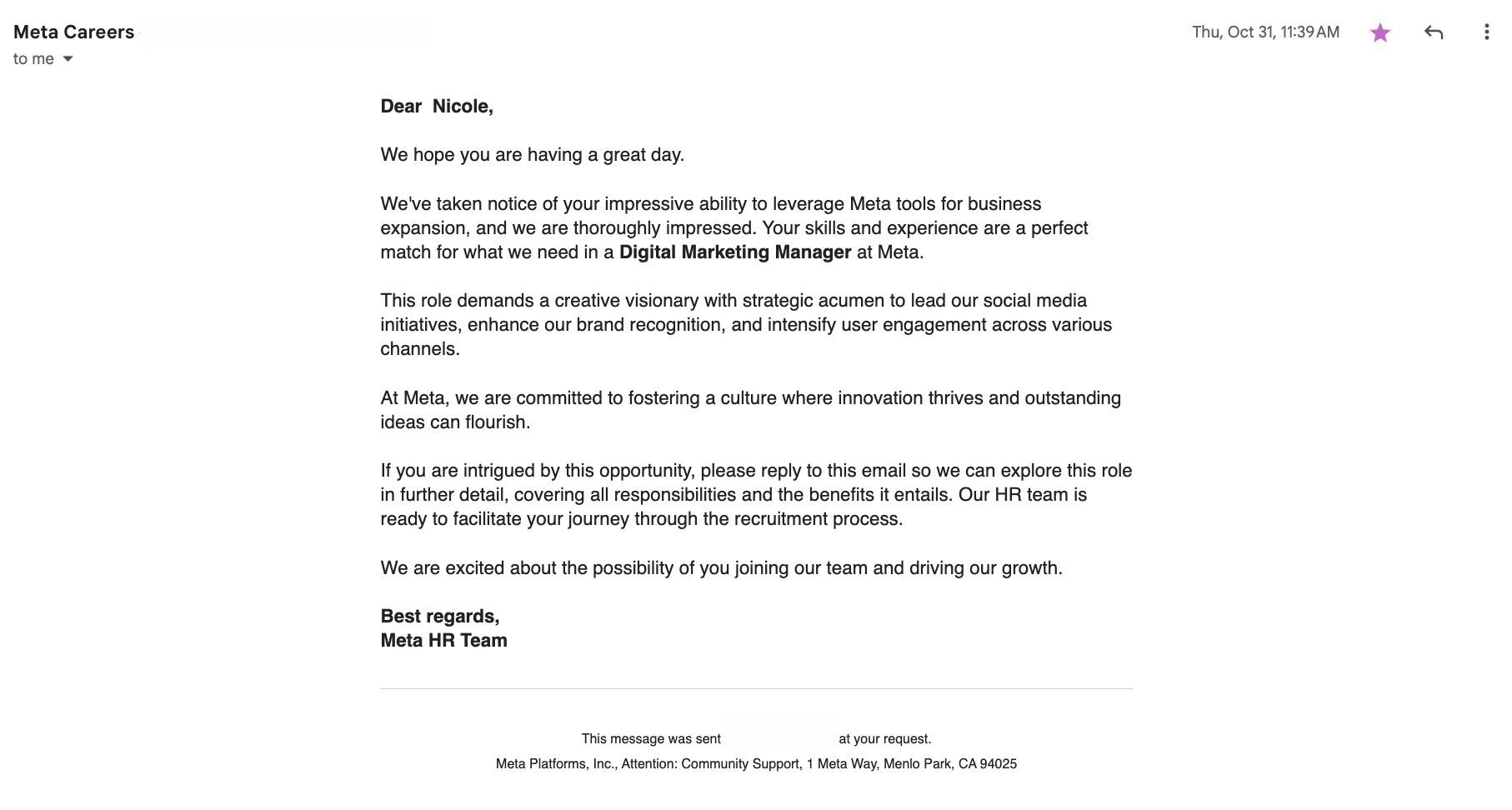
2. Red Bull Jobs
Another social media opportunity, this one was a bit more obvious for multiple reasons. First, the spelling of Red Bull is different in the "From." They spelt it as one word then two words in other sections. An employer would know how to spell their company name. The content of the email is generic and not personalized. Plus, they've also added a big bold red button for someone to click on. This is probably used to phish people.
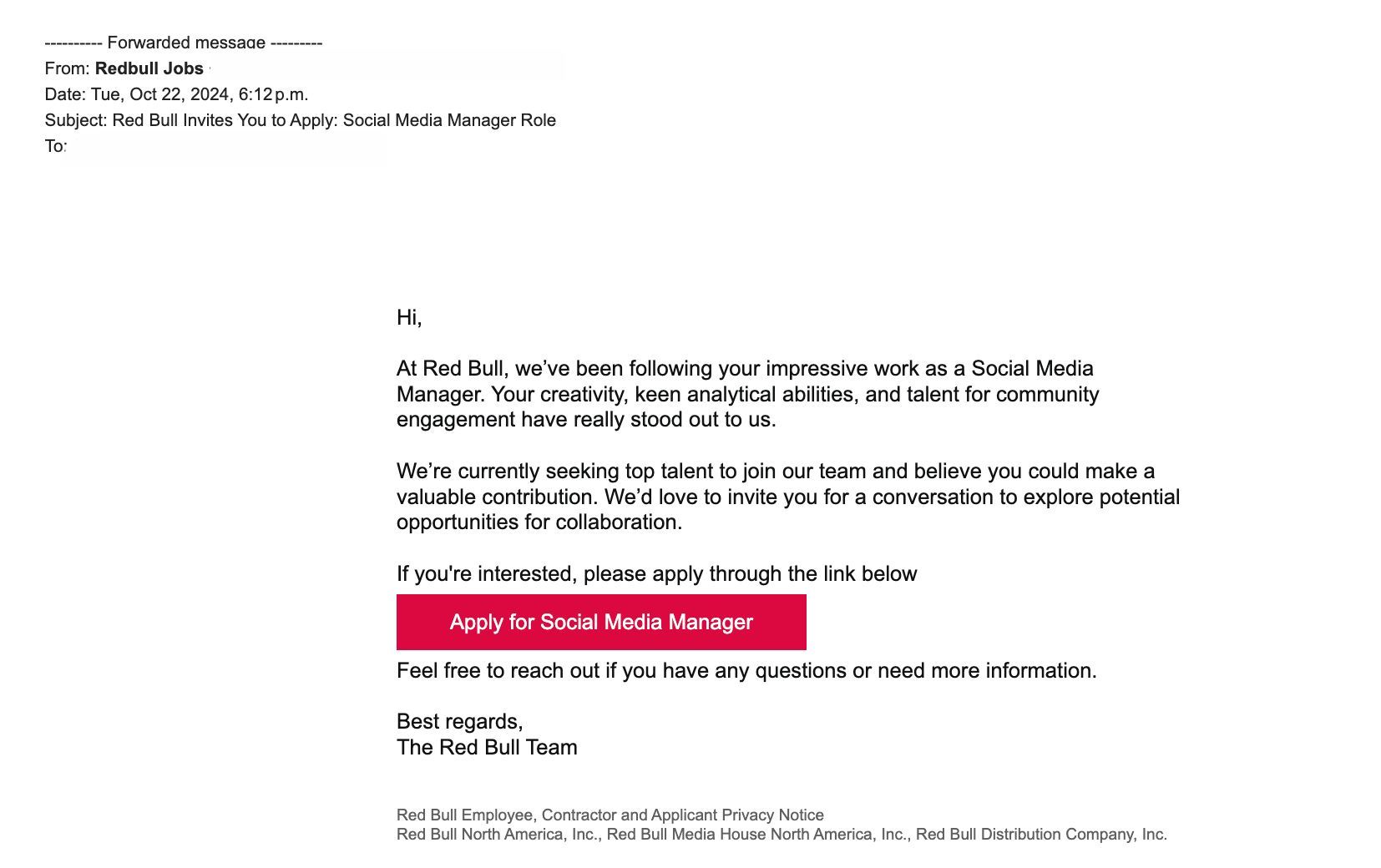
3. AI ML Engineer
With so many AI and ML jobs on the market, there's naturally set to be some scams around. The easiest giveaway of this scam is the 10 years of experience requested for a new and booming industry. The second giveaway was the email which was removed. And the next obvious thing is the formatting. A hiring manager wouldn't have sections of bolded text that don't highlight anything of importance. The lack of attention to detail in this scam is glaring. There's also no mention of the company you'd work for, which is another red flag.
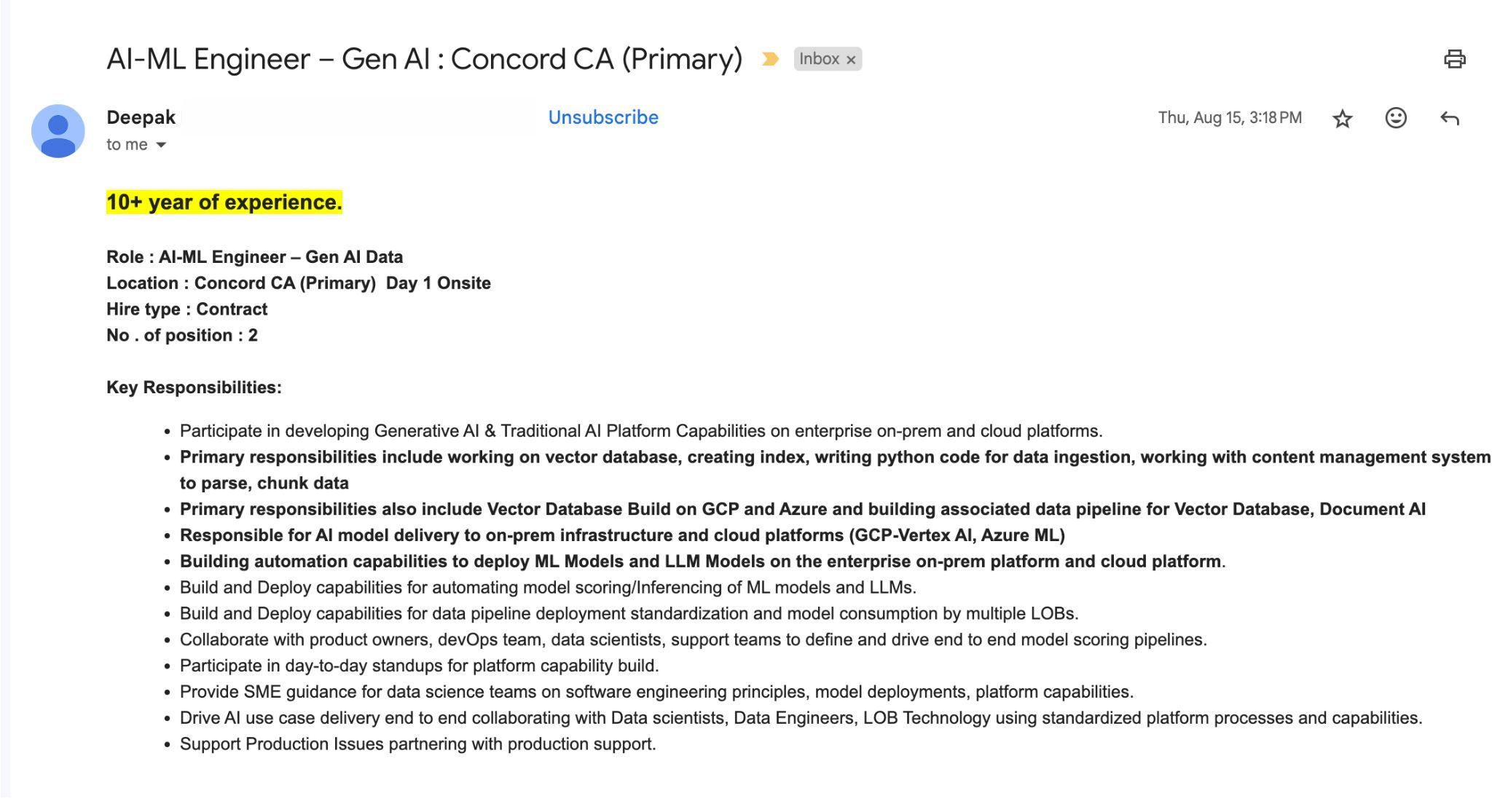
4. Adecco
There are many Adecco jobs listed on job sites. If you're looking for a job via Adecco, it's best to apply via their website directly. If you find their job posting on a third-party site it could easily be a scammer instead of a real potential employer. Work from home job scams are all too common. And in this WhatsApp message, they try to entice you with a flexible job. You need to be cautious when people offer opportunities like this as they're often work-from-home job scams. Scams have been around for a long time, but many scammers are now turning to WhatsApp and texting, which isn't common from a hiring manager. Plus, a giveaway that this isn't a real job placement is that the text was sent at 8:38 pm, which is long after work hours. And again, the text is sent without any personalization or addressing of the person they're messaging.
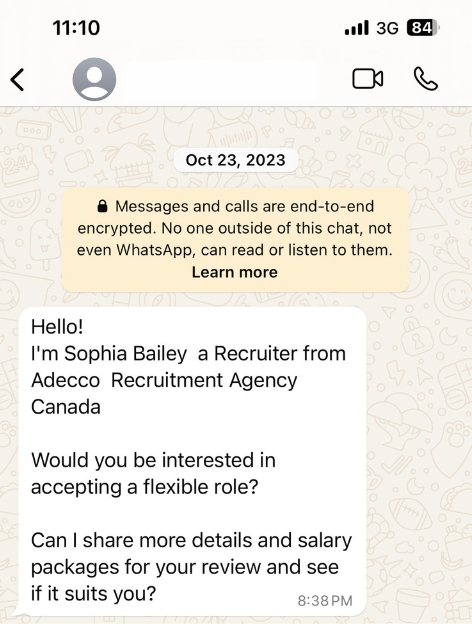
5. Canada's Pinnacle
Another type of job scam is the one below, a simple text scam. Again, the person they texted isn't addressed. They simply share their name and the company they work for. They prey on job seekers often by getting your phone number when you apply to their job posting online. They know people urgently want jobs so they text them at a time when job seekers are most vulnerable. These are sometimes easy to fall for, because you might not be carefully thinking about or looking to be scammed so you might accidentally reply only to realize something is often shortly after. Another indicator that this is fake to help you avoid a job scam is that no one in Canada starts a text with "Good Day!" it's too formal and not aligned with how Canadians communicate.
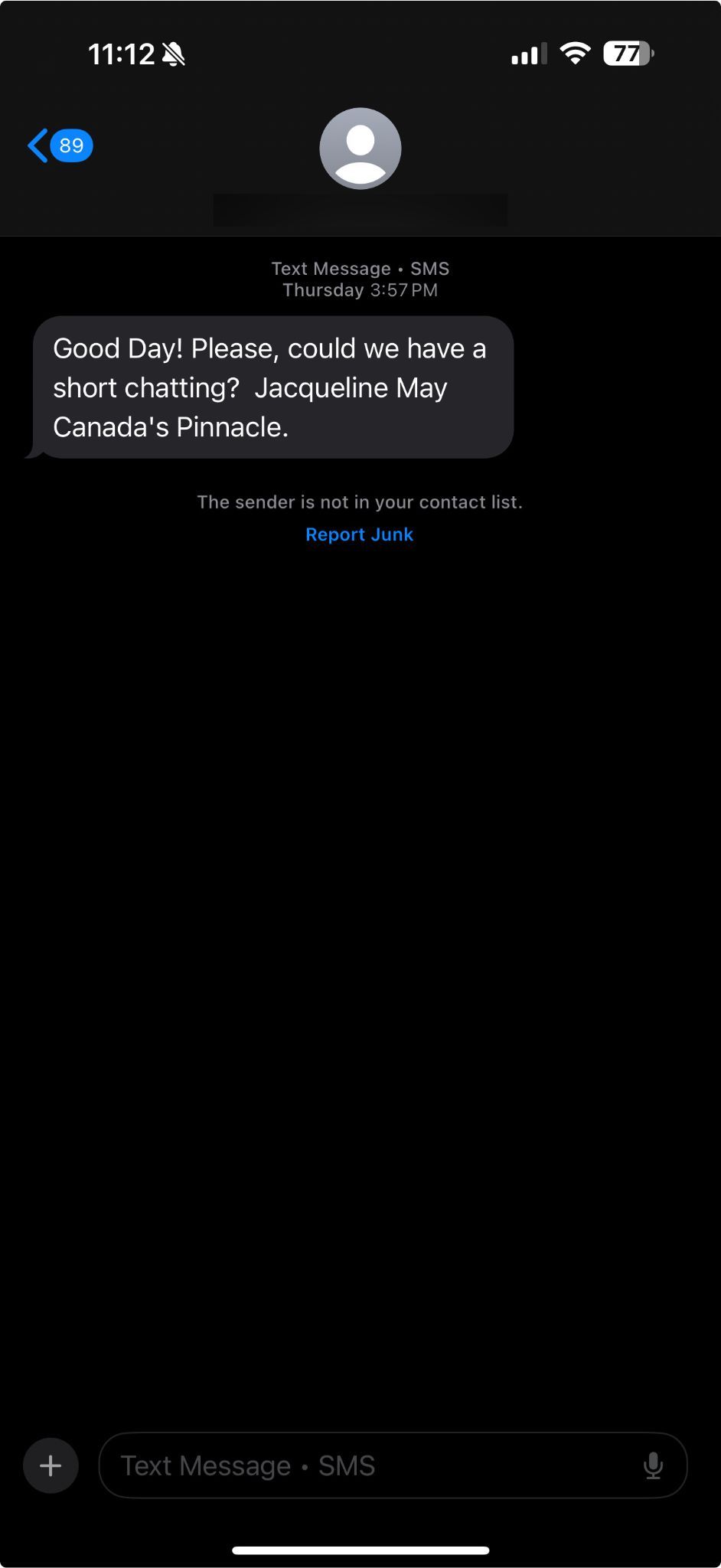
Conclusion
LinkedIn and other job search sites are great places to find jobs. And you shouldn't stop using them just because job scams happen there. You need to be vigilant during your job search. And even in the early days of joining a company. Phishing emails, mystery shopping jobs, commission based jobs, and work from home jobs are all common ways scammers try to entice you to give them money. You might want to report a fraudulent job by contacting your local government of fraud and cybercrimes. If you're actively looking for a job, you can sign up for Huntr to build your resume today.
Get More Interviews, Faster
Huntr streamlines your job search. Instantly craft tailored resumes and cover letters, fill out application forms with a single click, effortlessly keep your job hunt organized, and much more...
AI Resume Builder
Beautiful, perfectly job-tailored resumes designed to make you stand out, built 10x faster with the power of AI.
Next-Generation Job Tailored Resumes
Huntr provides the most advanced job <> resume matching system in the world. Helping you match not only keywords, but responsibilities and qualifications from a job, into your resume.
Job Keyword Extractor + Resume AI Integration
Huntr extracts keywords from job descriptions and helps you integrate them into your resume using the power of AI.
Application Autofill
Save hours of mindless form filling. Use our chrome extension to fill application forms with a single click.
Job Tracker
Move beyond basic, bare-bones job trackers. Elevate your search with Huntr's all-in-one, feature-rich management platform.
AI Cover Letters
Perfectly tailored cover letters, in seconds! Our cover letter generator blends your unique background with the job's specific requirements, resulting in unique, standout cover letters.
Resume Checker
Huntr checks your resume for spelling, length, impactful use of metrics, repetition and more, ensuring your resume gets noticed by employers.
Gorgeous Resume Templates
Stand out with one of 7 designer-grade templates. Whether you're a creative spirit or a corporate professional, our range of templates caters to every career aspiration.
Personal Job Search CRM
The ultimate companion for managing your professional job-search contacts and organizing your job search outreach.

